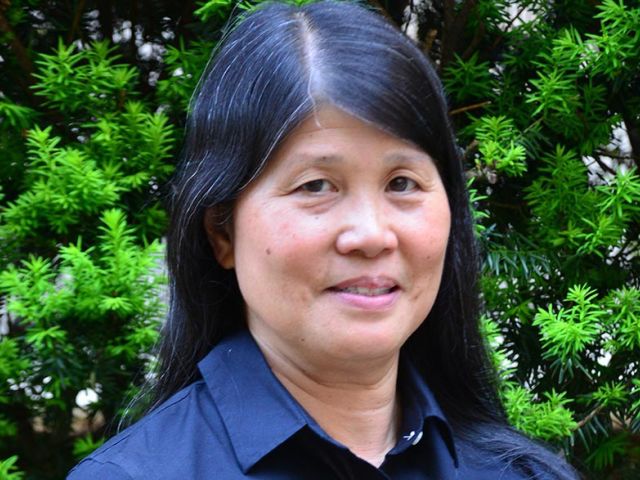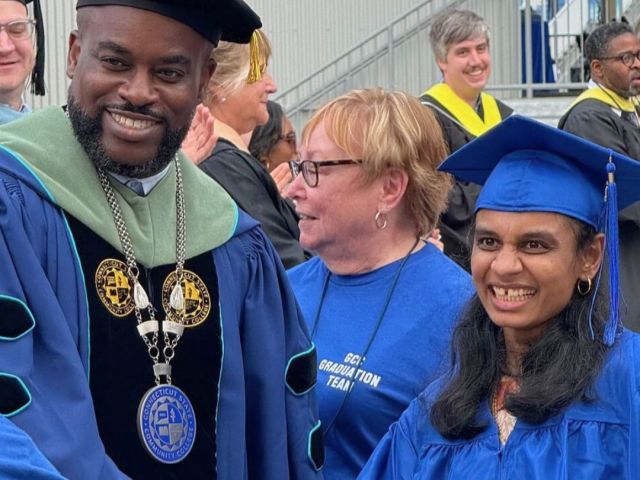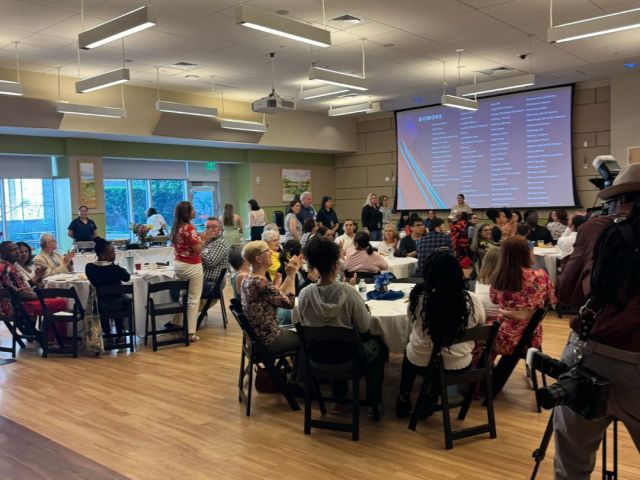News Center
Bringing you the latest news and events from Gateway Community College.
New Program Offers GCC Students a ‘Ticket’ Up the Academic Ladder
Share
Gateway Community College graduates earning associate degrees may now seamlessly transfer to a four-year university in the Connecticut State Colleges & Universities (CSCU) system. This new initiative allows students to pursue bachelors-degree studies in their chosen degree program without hassle or penalty.
Under the new Transfer Ticket program, students completing associate degree programs at Gateway or other participating Connecticut community colleges are guaranteed full academic status as juniors to pursue bachelors degrees in their majors without losing credits or having to undertake extra courses. The result is a potential savings to students of months of academic work as well as hundreds of dollars in tuition, fees and expenses.
“Connecticut has developed something that no other state has, and we are going to be a national model,” explained Lauren Doninger, EdD, LADC, LP, a Gateway psychology professor who coordinates the new program and was instrumental in its design and implementation across the CSCU system.
Participating institutions include all 12 of Connecticut’s community colleges, including both Gateway and Housatonic Community College in Bridgeport. Upon completing an associate degree, students may transfer as juniors to Southern Connecticut State University, Central Connecticut State University, Western Connecticut State University, Eastern Connecticut State University and Charter Oak State College in New Britain.
Gateway is the first two-year institution in Connecticut to fully implement the Transfer Ticket program. Since its introduction in the spring semester of 2017 more than 550 students have signed up to participate in the initiative, making Gateway the largest user of Transfer Tickets.
Participating students are teamed with an academic advisor at each school to help them navigate the academic requirements of their chosen major. The Transfer Ticket program also makes available financial aid to qualified students.
Before the introduction of Transfer Tickets earlier this year, requirements for new associate degree holders to enroll in four-year CSCU universities varied by school and academic department. That system posed a bureaucratic barrier that discouraged many students from pursuing their dreams of a higher education — and the career doors many hoped their academic endeavors would open.
In 2012 Connecticut’s community colleges and four-year universities were reorganized under the new CSCU administrative umbrella. One of the first mandates to member institutions, according to Doninger, was to make transferring more seamless. Previously, “There were lots of student complaints about how cumbersome the process was.” The problem, she explained, stemmed from a lack of communication between and among institutions as well as a lack of updated information on the part of student advisors about how to use the new, streamlined transfer system.
Preparing students to advance up the academic ladder to enter a bachelors-degree program has always been one of the two principal missions of Connecticut community colleges, along with providing occupational programs for students.
For example, “A student would enroll in an occupational program in, say, computer science, and think they had the first two years of a computer-science bachelors degree completed,” Doninger explained. “But they didn’t have anywhere near the academic preparation for a four-year computer-science degree because they didn’t have enough math preparation — entering a computer-science B.S. program requires, at a minimum, Calculus II. So there was a lot of that type of disconnect.”
The Transfer Ticket initiative was designed to help students bridge that divide. Doninger was named to a 17-member group representing each of the colleges and universities appointed by the state Board of Regents of Higher Education to lower or eliminate administrative barriers to consolidation among the two- and four-year colleges — and to make it dramatically simpler for students to navigate the maze separating academic departments and schools. Thus was born the idea that would become the Transfer Ticket.
Nicoletta Blevins is a Gateway student who declared a major in Liberal Arts & Sciences. After completing her course requirements for an associate degree she plans to enroll as a political science major at the University of Connecticut The Transfer Ticket has paved the way.
“Knowing that I have a place at a four-year college without having to worry about classes that might not transfer has made my [Gateway] experience more enjoyable and less stressful,” Blevins said. “Since the criteria to transfer
is so clearly mapped out, it makes my vision for success much more easy to grasp.”
Academic preparation for the program includes 30 credits of “Framework” general-education courses that satisfy the requirements of all 17 CSCU schools, as well as 30 “Pathway” credits of coursework including both prerequisites to admission in the desired four-year major and early courses toward a bachelors degree in that major. Students having completed those 60 credits are eligible for admission as full-fledged juniors in any of the five four-year CSCU universities. “The key thing is they will have only 60 credits remaining to complete to earn a bachelors degree” requiring a total of 120 credits, explained Doninger. “And that’s the really big change.”
But it’s not the only change.
“The really amazing thing that Transfer Ticket degrees do is to map out the academic requirements for a student [to complete a degree program] in the same way an entering major would be mapped out if they started college at the senior institution,” Doninger said.
More information about the Transfer Ticket program is available by visiting ct.edu/transfer. The website includes information organized according to major and campus as well as contact information for each of the 17 participating CSCU institutions.






